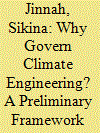| Srl | Item |
| 1 |
ID:
130995


|
|
|
|
|
| Publication |
2014.
|
| Summary/Abstract |
Different international regimes are built from legal instruments that vary in terms of whether they are multilateral, bilateral, or a combination thereof. We investigate the reasons for such variation. The choice between multilateralism and bilateralism is a function of the tradeoff between each instrument's relative flaw. Multilateralism is wasteful in incentives, as the same agreement is offered to all states regardless of their compliance costs. Bilateralism mitigates this problem by allowing for more tailored agreements but in the process multiplies transaction costs by requiring many of them. We use a formal model to generate propositions on the design of "lateralism" and the related issue of membership size and offer illustrations in the context of four regimes: foreign direct investment, human rights, climate change, and international trade.
|
|
|
|
|
|
|
|
|
|
|
|
|
|
|
|
| 2 |
ID:
160059


|
|
|
|
|
| Summary/Abstract |
Despite the important risks, uncertainties, and potentials surrounding emerging climate engineering technologies, governance of these technologies is lacking. This article asks: how can rationales underlying governance demand for climate engineering technologies inform strategies for governance design? It posits that demand rationales can be coupled with broad insights from theories of global governance to initiate governance proposals and discussions surrounding these emerging technologies. It proposes a preliminary framework that considers how the constellation of functional, strategic, and normative demand rationales for climate engineering technologies can inform the appropriate control mechanisms and degree of polycentricity in governance design.
|
|
|
|
|
|
|
|
|
|
|
|
|
|
|
|